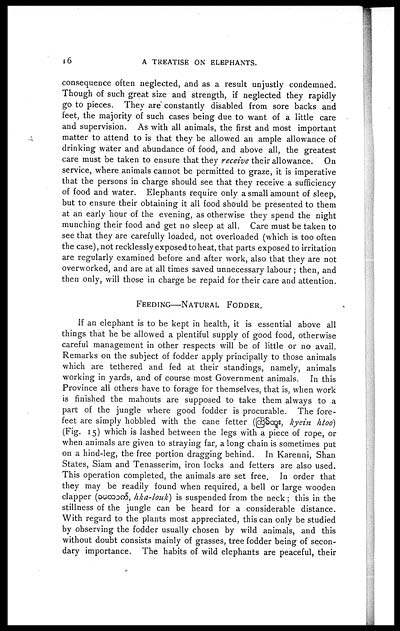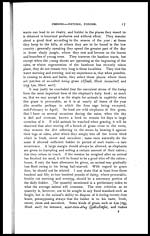Medicine - Veterinary > Veterinary diseases > Elephants and their diseases > Part I - Supply, general hygiene, gear, mounting and restraint
(44) Page 16
Download files
Individual page:
Thumbnail gallery: Grid view | List view

16 A TREATISE ON ELEPHANTS.
consequence often neglected, and as a result unjustly condemned.
Though of such great size and strength, if neglected they rapidly
go to pieces. They are constantly disabled from sore backs and
feet, the majority of such cases being due to want of a little care
and supervision. As with all animals, the first and most important
matter to attend to is that they be allowed an ample allowance of
drinking water and abundance of food, and above all, the greatest
care must be taken to ensure that they receive their allowance. On
service, where animals cannot be permitted to graze, it is imperative
that the persons in charge should see that they receive a sufficiency
of food and water. Elephants require only a small amount of sleep,
but to ensure their obtaining it all food should be presented to them
at an early hour of the evening, as otherwise they spend the night
munching their food and get no sleep at all. Care must be taken to
see that they are carefully loaded, not overloaded (which is too often
the case), not recklessly exposed to heat, that parts exposed to irritation
are regularly examined before and after work, also that they are not
overworked, and are at all times saved unnecessary labour; then, and
then only, will those in charge be repaid for their care and attention.
FEEDING—NATURAL FODDER.
If an elephant is to be kept in health, it is essential above all
things that he be allowed a plentiful supply of good food, otherwise
careful management in other respects will be of little or no avail.
Remarks on the subject of fodder apply principally to those animals
which are tethered and fed at their standings, namely, animals
working in yards, and of course most Government animals. In this
Province all others have to forage for themselves, that is, when work
is finished the mahouts are supposed to take them always to a
part of the jungle where good fodder is procurable. The fore-
feet are simply hobbled with the cane fetter (, kyein htoo)
(Fig. 15) which is lashed between the legs with a piece of rope, or
when animals are given to straying far, a long chain is sometimes put
on a hind-leg, the free portion dragging behind. In Karenni, Shan
States, Siam and Tenasserim, iron locks and fetters are also used.
This operation completed, the animals are set free. In order that
they may be readily found when required, a bell or large wooden
clapper (, hka-louk) is suspended from the neck; this in the
stillness of the jungle can be heard for a considerable distance.
With regard to the plants most appreciated, this can only be studied
by observing the fodder usually chosen by wild animals, and this
without doubt consists mainly of grasses, tree fodder being of secon-
dary importance. The habits of wild elephants are peaceful, their
Set display mode to: Large image | Zoom image | Transcription
Images and transcriptions on this page, including medium image downloads, may be used under the Creative Commons Attribution 4.0 International Licence unless otherwise stated. ![]()
| India Papers > Medicine - Veterinary > Veterinary diseases > Elephants and their diseases > Supply, general hygiene, gear, mounting and restraint > (44) Page 16 |
|---|
| Permanent URL | https://digital.nls.uk/75192152 |
|---|



![[Page 15]](https://deriv.nls.uk/dcn4/7519/75192151.4.jpg)
